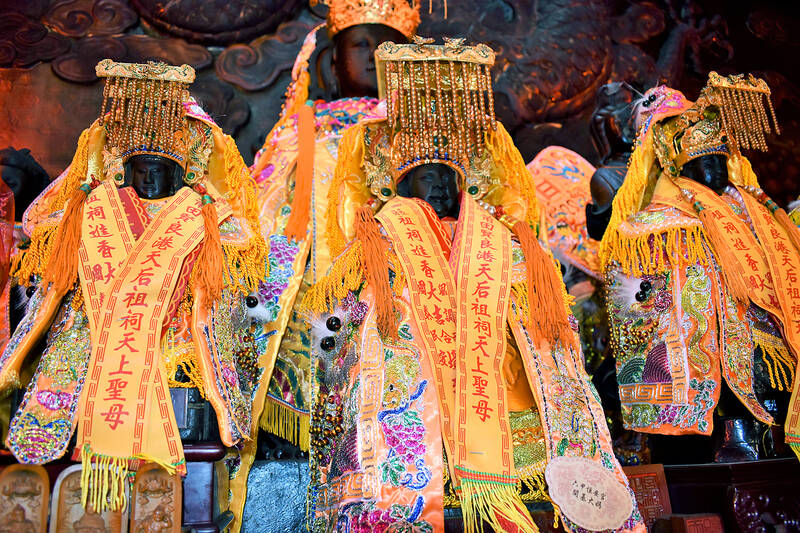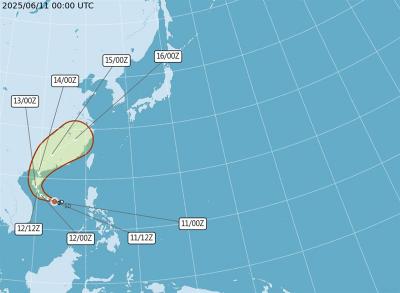The Taiwan Statebuilding Party yesterday alleged that a visit planned by the Matsu Temple in Meizhou Township in China’s Fujian Province for November is an attempt by the Chinese Communist Party (CCP) to use religion as part of its “united front” tactics.
The party urged national security agencies to thoroughly vet those visiting to prevent Chinese spies from entering Taiwan.
China’s Taiwan Affairs Office (TAO) spokeswoman Zhu Fenglian (朱鳳蓮) said that multiple groups, including the Taiwan Matsu Fellowship, had signed a petition requesting that the Meizhou Matsu tour Taiwan.

Photo: Yang Chin-cheng, Taipei Times
The Meizhou temple had been quick to respond and arranged to visit from Nov. 3 to 13, she said.
Matsu is a deity revered by people on both sides of the Strait, and the Meizhou Matsu is no stranger to Taiwan, having previously visited to great fanfare, Zhu said.
The TAO is “happy to see the Meizhou Matsu tour Taiwan and bless our Taiwanese compatriots with her grace,” Zhu said.
Taiwan Statebuilding Party Chairman Wang Hsing-huan (王興煥) said that trade, commerce, religion, education, culture and tourism are all means used by China to spread its “united front” rhetoric.
Anyone who denies this is either working with China or is completely ignorant of China, he said.
Wang said The Economist had reported that China was attempting to infiltrate Taiwan via connections in religious circles.
The Taiwan Matsu Fellowship and the Taiwan First Matsu Fellowship, representing Jenn Lann Temple (鎮瀾宮) in Taichung’s Dajia District (大甲) and Gongfan Temple (拱範宮) in Yunlin County’s Mailiao Township (麥寮) respectively, had previously invited the Meizhou Matsu to Taiwan, Wang said, adding that high-ranking representatives of both fellowships had also met with TAO Director Song Tao (宋濤).
Wang called on the Mainland Affairs Council (MAC) to base its review of the Meizhou group on whether any are mouthpieces for China’s “united front” tactics and asked national security agencies to prevent questionable parties from entering Taiwan.
Taiwan Statebuilding Party spokeswoman Yang Pei-hua (楊佩樺) said that China is using the event as a platform for its “united front” rhetoric, even saying that Matsu is like a mother to Taiwanese.
The Matsu Temple has sent out invites to Taiwanese temples and followers asking them to attend events in Fujian, she said, adding that Chinese media are reporting that Taiwan’s religious groups are answering the invitations.
National security agencies must be on guard regarding the November visit, she said.

A magnitude 6.4 earthquake struck off the coast of Hualien County in eastern Taiwan at 7pm yesterday, the Central Weather Administration (CWA) said. The epicenter of the temblor was at sea, about 69.9km south of Hualien County Hall, at a depth of 30.9km, it said. There were no immediate reports of damage resulting from the quake. The earthquake’s intensity, which gauges the actual effect of a temblor, was highest in Taitung County’s Changbin Township (長濱), where it measured 5 on Taiwan’s seven-tier intensity scale. The quake also measured an intensity of 4 in Hualien, Nantou, Chiayi, Yunlin, Changhua and Miaoli counties, as well as

Taiwan is to have nine extended holidays next year, led by a nine-day Lunar New Year break, the Cabinet announced yesterday. The nine-day Lunar New Year holiday next year matches the length of this year’s holiday, which featured six extended holidays. The increase in extended holidays is due to the Act on the Implementation of Commemorative and Festival Holidays (紀念日及節日實施條例), which was passed early last month with support from the opposition Chinese Nationalist Party (KMT) and Taiwan People’s Party. Under the new act, the day before Lunar New Year’s Eve is also a national holiday, and Labor Day would no longer be limited

COMMITMENTS: The company had a relatively low renewable ratio at 56 percent and did not have any goal to achieve 100 percent renewable energy, the report said Pegatron Corp ranked the lowest among five major final assembly suppliers in progressing toward Apple Inc’s commitment to be 100 percent carbon neutral by 2030, a Greenpeace East Asia report said yesterday. While Apple has set the goal of using 100 percent renewable energy across its entire business, supply chain and product lifecycle by 2030, carbon emissions from electronics manufacturing are rising globally due to increased energy consumption, it said. Given that carbon emissions from its supply chain accounted for more than half of its total emissions last year, Greenpeace East Asia evaluated the green transition performance of Apple’s five largest final

The first tropical storm of the year in the western North Pacific, Wutip (蝴蝶), has formed over the South China Sea and is expected to move toward Hainan Island off southern China, the Central Weather Administration (CWA) said today. The agency said a tropical depression over waters near the Paracel and Zhongsha islands strengthened into a tropical storm this morning. The storm had maximum sustained winds near its center of 64.8kph, with peak gusts reaching 90kph, it said. Winds at Beaufort scale level 7 — ranging from 50kph to 61.5kph — extended up to 80km from the center, it added. Forecaster Kuan Hsin-ping